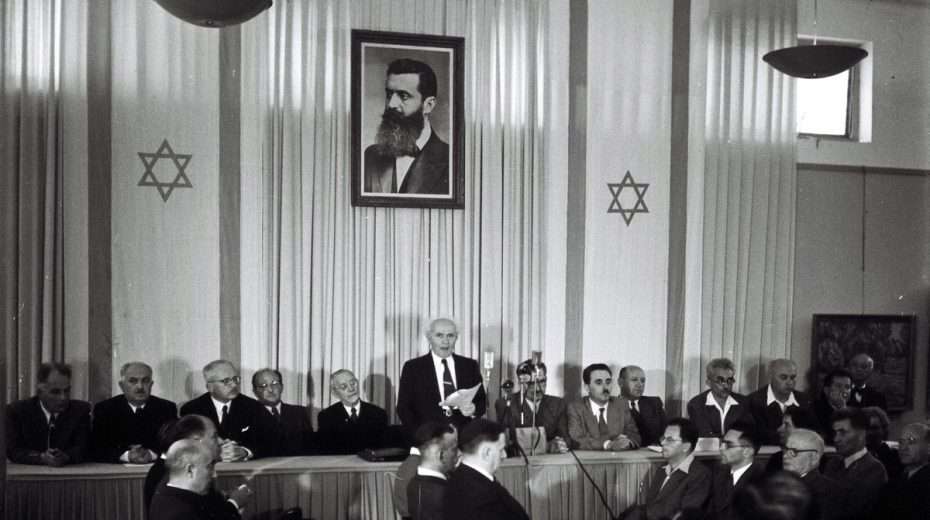(JNS) This week, 75 years ago, amid a war for its survival, David Ben-Gurion solemnly declared the establishment of the Jewish state: the State of Israel. But since that fateful day of May 14, 1948, Israeli society has become so divided that the historic document has become a weapon in the hands of parties that interpret the Declaration of Independence in a way that meets their agenda, regardless of the authentic intention of its authors, the leaders of the nascent Jewish state.
As a result, a heated debate has emerged in Israel over what being Israeli means, what is the difference between being Israeli and being Jewish, which of the two takes priority, and whether we can have a just society for all its citizens when the country is defined as the homeland of the Jews.
For 75 years, we have been unable to resolve these questions. In my opinion, even if we continue to debate for the next 75 years, we will not agree. Each side will only become more entrenched in its opinion, and misunderstanding will translate into more division and internal hatred.
The great 20th-century thinker and kabbalist Baal HaSulam once wrote about the obstinacy of Jews: “They [the divided parties] believe that, in the end, the other side will understand the danger and will bow his head and accept their view.”
“But I know,” he writes, “that even if we tie them up together, one will not surrender to the other even a little, and no danger will interrupt anyone from carrying out his ambition.”
These words, which were written in the essay “Exile and Redemption” in the 1930s, ring very true today, as the discourse in Israel becomes increasingly polarized and vitriolic.
We may need to revisit the Declaration of Independence, but its foundation should remain. The existence of the State of Israel represents the fulfillment of the hopes of Jews for thousands of years. But what we should discuss is not the characteristics of the state, but rather the understanding of the essence and purpose of the people of Israel itself.
If the State of Israel continues to justify its existence merely on the argument that this is our historic land, that we were promised it by God or that we have no place else to go because we are banished and exterminated everywhere else, we will not be able to justify Israel’s existence to ourselves or to the nations. Our justification for existence lies in our purpose, and the purpose of our existence has nothing to do with us, but rather with the rest of humanity.
The people of Israel was founded based on brotherly love, and only when we maintain such relations are we regarded as a nation. Moreover, as soon as we met the condition of brotherly love, we were commanded not to keep our unity to ourselves but to set an example for the world, to be “a light to the nations.”
Indeed, if we look at the history of our nation, we will find that all our tragedies befell us after extended periods of growing division and self-hatred that continued to escalate even when it became clear that our division would lead to ruin. This is what Baal HaSulam meant when he wrote, “No danger will interrupt anyone from carrying out his ambition.”
Accordingly, our best times as a nation came when unity prevailed among the people.
Because our success and failure are so inherently entwined in our unity, we can determine our national fate. If we choose unity, no matter what division we must overcome to achieve it, we will thrive as a nation and as a country. If we succumb once more to division, we will lose the basis of our identity as a nation whose purpose is to serve as a model of cohesion. In consequence, the nation will fall to pieces and the country will disintegrate.
Unlike any other nation, the Israeli nation is not dependent on anyone’s assistance or affirmation. The only thing that determines our success or failure, the only thing on which we are dependent, is our unity and our willingness to become a model nation for humanity.
















Israel is a person, the Lord Jesus Christ, you will eventually know him as Messiah. (Is 49:3) His people are called Israel, they are set apart from the rest of humanity by their faith. It used to be just the Jewish people but after Messiah atoned for the sin of the world all peoples can become Israel.
Their faith in God unites them. Although they can’t see him they believe that he is and that he rewards those who seek him. (Heb 11:6) They have the faith of Abraham, he is the father of faith (Rom 4:11) as well as being a patriarch of Israel. Oh, that all Jewish people had his faith too. Oh, that at least Israel’s rabbis had his faith. But they don’t, they revel in Moses rule book instead.
Israel’s true identity is in Messiah. Faith is needed to believe in God. Ruach HaKodesh brings souls to faith and empowers them for God’s glory, be they a Bezalel, Elijah or disciple.
Listen to your messianic brethren and learn true Israeli identity. Now that Israel is a light to the nations.
For some Jewish people, ‘to become a model nation for humanity’ may sound a bit daunting. But the God of Israel is so kind to His people in Israel that He gave certain instructions in the Tanakh – a practical example would be Ezekiel 47:21-23 for the allocation of the Promised Land. For the scripture-believing government to take up His instruction like this would be an essential element for the fulfilment of Ezekiel 28:25-26, in which the God of Israel to ‘be proved holy through them [Jews] in the sight of the nations. Then they will live in their own land, which I gave to my servant Jacob. They will live there in safety …’ The Lord God who chose Israel is such a caring God, and the Israeli government must honour Him in actions.